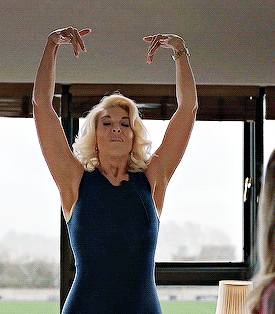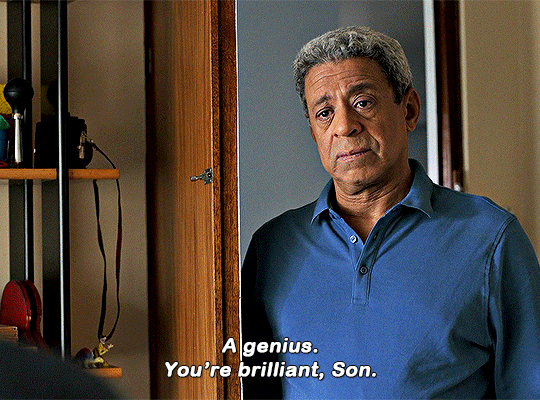The Ted Lasso Relationship Guide: Nate's Self-Motivation
The evolution of Nate's means of building up his confidence
I’ve taken a break from writing about Ted Lasso for a while, so it’s time we get back to it. I have recently been rewatching the show, and I have yet again been drawn to Nate’s story arc. In a show filled with so many characters who grow and change, his story continues to be the one that captures my attention.
One scene that has been rolling around in my brain a lot lately is the season 2 episode, “Rainbow.” Nate visits Keeley and asks her to help make him famous. This already speaks to so much about what drives Nate in the latter half of the season, but she takes it as an opportunity to help make Nate more assertive. She and Rebecca get together with him, trying to help him find the sweet spot between subservient and cruel.
In one of my favorite Rebecca moments on the whole show, she explains to Nate that when she goes into a room filled with rich and powerful men, she likes to make herself big so she can feel her power. She then proceeds to rear up on her tiptoes, extending her arms out over her head, and hisses. It is a spectacular bit of physical comedy from Hannah Waddingham, and it wows both Nate and Keeley.
Later, Nate is at A Taste of Athens with his parents. He approaches Jade, asking her for the window table, and is yet again rebuffed. He excuses himself to the bathroom, where he tries Rebecca’s approach to make himself large. But Nate is small in stature and is unable to convince himself that he is large by doing what she did.
Instead, he gets close to the mirror, says, “You are Nathan fucking Shelley,” and then spits at his reflection.
Using a mirror to hype yourself up is a fairly common practice. We can’t always have someone there to tell us how awesome we are, so doing that for yourself can help.
But Nate adds another step with the spit, and that says something about his upbringing and how that has affected his view of himself.
We know that Nate’s father has never been particularly effusive with his praise. When Nate’s coaching decision leads Richmond to a major win, he visits his parents’ house and sees his face in the newspaper that his dad is reading. When Nate calls attention to it, Lloyd responds with a backhanded insult, suggesting that Nate is too full of himself.
When Nate gives himself a pep talk, he includes an element of self-loathing. He starts by reminding himself of his identity, which most people do as a means of reinforcing their humanity and, therefore, their value as a person. But as soon as he says his name, his intrinsic reaction is to spit at himself. So he honors his worth in one moment, and in the next, he invalidates it.
I think it’s interesting that Nate’s self-esteem issues often present as arrogance. As season 2 progresses and into season 3, Nate is shown to treat other people as less important than himself. He uses insults to motivate people, and it’s easy to believe that’s because Nate thinks so much of himself. We often see him scrolling on social media, looking for his name, listening to podcasts about himself, and generally looking for ways to build himself up. But all of these are symptoms of low self-esteem.
In one of the last episodes, there is a conversation between Nate and Lloyd where Lloyd apologizes for not supporting Nate more, especially as a child. Nate tells his father that he assumed that Lloyd hated when he played the violin because Lloyd literally told him that, and Lloyd responds by saying that he didn’t know how to parent a genius. Instead of building Nate’s self-worth, Lloyd would push him to be even better, never praising where he was already excelling.
Over time, and without any therapy, that put Nate in an impossible position. On one hand, he was smart enough to recognize that he was skilled at a number of things. He could see areas where he was knowledgeable, but because he had never received affirmation for his skills, he was unable to offer that to others. He treated other people with some measure of contempt because that was the context he had for motivation.
So it’s little surprise that when Nate was looking for a way to motivate himself, he would turn to something that was also a form of self-degradation. It’s the only kind of motivation that he knows.
Watching this forces me to think about how I am motivated and how I motivate others. I know that I look for approval from others, often to a detrimental degree. If someone isn’t going to recognize what I’ve done, is it even worth doing? And while I do think that we all crave some kind of acknowledgment from outside sources, it can become a drain on those we love and on our self-worth if we cannot find contentment from within.
At the end of the show, we see Nate returning to arts and crafts to find his courage. When he asks Jade out, he doesn’t spit at himself but makes her a gift. And when that gets ruined, he doesn’t give up but keeps going. In one of the final scenes in which he appears, we see him using art to repair the Believe sign in the kintsugi style. Using art to heal and motivate is a beautiful sign of growth for Nate. Maybe it won’t inspire anyone to invade France, but perhaps it can inspire us to be gentle with ourselves and others.








